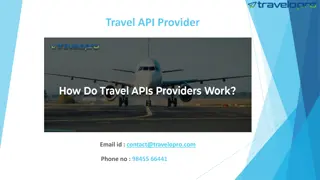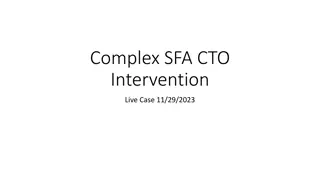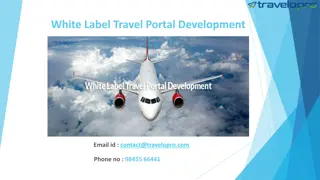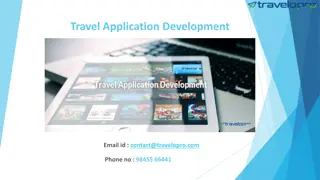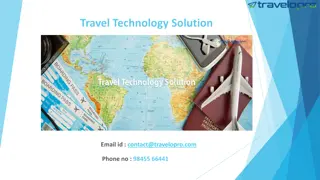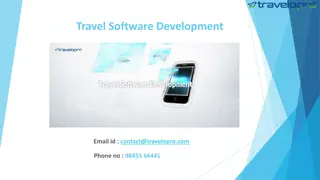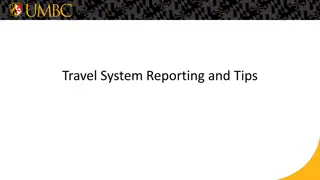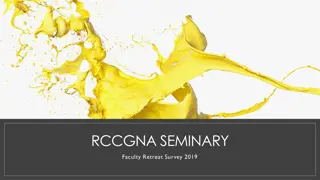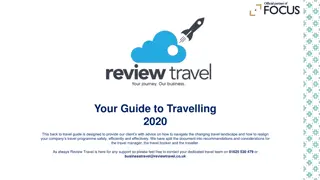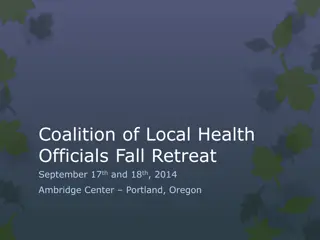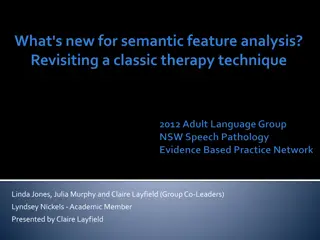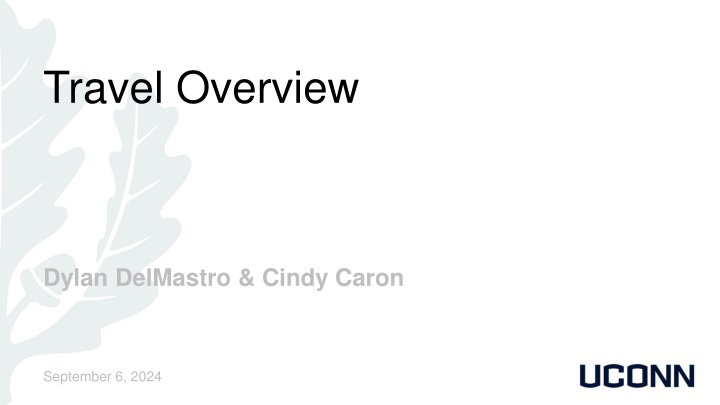
Best Practices for Traveling: Airfare, Hotels, and Expense Management
Discover essential tips for seamless travel, including pre-travel practices for airfare bookings, guidance on hotel reservations, and insights on managing travel expenses effectively with travel cards. Learn how to optimize your trips and reduce costs for a stress-free travel experience.
Download Presentation

Please find below an Image/Link to download the presentation.
The content on the website is provided AS IS for your information and personal use only. It may not be sold, licensed, or shared on other websites without obtaining consent from the author. If you encounter any issues during the download, it is possible that the publisher has removed the file from their server.
You are allowed to download the files provided on this website for personal or commercial use, subject to the condition that they are used lawfully. All files are the property of their respective owners.
The content on the website is provided AS IS for your information and personal use only. It may not be sold, licensed, or shared on other websites without obtaining consent from the author.
E N D
Presentation Transcript
Travel Overview Dylan DelMastro & Cindy Caron September 6, 2024
Travel Cards Need A Travel Card? If you do, here are the steps for applying for one Travel Card Training & Travel Card Request Form The University backed Travel card and Pro-Card programs provide a payment avenue for UConn employees and students and are both reconciled via Concur. o Travel Card - The main use of the UConn Travel Card is for purchasing and paying for expenses directly related to Travel, such as airfare, car rental, hotel etc., this also includes virtual conference registration fees. o Pro-Card - The UConn Pro-Card is an extremely efficient and effective method of purchasing and paying for goods and services with a value less than $4,999.99 and is designed to more efficiently meet your purchasing needs and those of the University. o Approved Uses - The following are examples of the types of items that may be purchased with the Travel Card and the Pro-Card.
Pre-Travel Best Practices For Airfare Travel & Entertainment Policy 1. Review your itinerary within 24 hours (window for voiding without penalty) of booking on Concur or on the phone with your UConn designated travel agency. Immediately notify UConn s designated travel agency of any discrepancies found once you receive your email confirmation. 2. Whenever possible, avoid changing your reservation once it has been ticketed. Airline change fees can substantially increase the overall cost of the ticket. 3. Always cancel any ticket prior to the departure of the outbound flight if you won t be using it. If this is not done, in most cases, the ticket retains no value for future use. 4. Make reservations 6-8 weeks prior to travel if possible. This enables you to take advantage of lower fares, as well as increases the possibility of getting your preferred seat assignment. 5. When making reservations, choose the least expensive nonrefundable fare. Refundable fares are often double or triple the nonrefundable rate.
Pre-Travel Best Practices For Airfare 6. If possible, use the same airline for the entire trip. Changing airlines usually results in one-way tickets, which are generally more expensive. 7. Whenever possible, combine business trips. Several stops on one trip or visiting multiple clients/recruits/etc. In the same city will generally be less costly than two round trips. 8. When possible, schedule midday meetings. This often enables you to avoid peak times at airports. 9. Based on the possibility for flight delays, make sure you have extra time between your flight arrival and you're meeting or event. It is advisable to book one flight earlier than your intended arrival time so there is a backup flight in case of delays or cancellations.
Pre-Travel Best Practices For Hotels 1. If you need to cancel your room after you have made your reservation, be sure to cancel it prior to the cancellation deadline to avoid penalties. Hotels will usually charge a minimum one-night room penalty (sometimes more than one night) for no-shows . 2. Nonrefundable prepaid hotel stays may be lower in cost, however, because changes may occur with travel, we do not recommend you book this type of rate as this would result in the total loss of the repaid amount. 3. Some hotels will include a complimentary breakfast with your room stay. Take advantage of this if possible as it can be an easy and convenient option. 4. Business hotels usually offer transportation shuttles to major business areas, or they can assist travelers with securing taxis if you decide not to book a car rental.
Pre-Travel Best Practices For Car Rentals 1. UConn s preferred car rental company is Enterprise/National. The contract Loss Damage Waiver (LDW) and Liability coverage in the rate. 2. GPS systems are helpful but cost approximately an additional $10 to $20 per day. You may need prior approval from your department before you request it. (Most cell phones have a Maps app you can use instead.) 3. Car rentals are based on a 24-hour clock. For example, if you pick up your vehicle at 9:00 a.m. on Monday and return it at 10:30 a.m. on Tuesday, you ll usually be charged for two full days. 4. Before you drive away from the pickup station, inspect the car carefully for body damage. Be sure the lights and turn signals are working properly and check the mileage odometer. 5. Always fill the tank yourself before returning the vehicle, so you're only paying for the gas you used. 6. An extra fee is usually charged if a car is returned to a different location than where it was picked up. Make sure you are aware of any drop-off charges.
Per-Diem vs. Actual We have seen an increase in the number of travelers attempting to claim Per Diem reimbursement in combination with Individual Actual Meals on the same expense report. Travelers must choose to use either the Per Diem or Actuals method for meal expenses on a single trip. What are the Actuals and Per Diem methods? Actuals The maximum reimbursement for actual meal costs, including tax and tips. Each meal expense is added to a Concur expense report under the expense type of Individual actual Meals. Receipts are required for expenses over $25.00 out of pocket or over $50.00 if purchased using the UConn travel card. The allowable amount is calculated daily and is not aggregated over the entire period of the trip. Per Diem Daily allowances paid to employees to cover meal costs incurred while on a UConn business trip. The Daily allowance or Meal Per diem is added to the Concur expense report via creation of a Travel Allowance Itinerary. Travelers using this method would NOT be eligible to use their travel card for individual meal purchases on the same trip. Note: When using either method the amount may not exceed the daily limits, based on the meal per diem rates published by the GSA the allowance applicable to the first and last day of travel will be 75% of the full day Per Diem.
SFA Travel Policy Updated SFA Travel Policy POLICY It is the responsibility of the traveler to consult and follow the applicable University and SFA travel policies. We recommend all travelers apply for a University Travel Card to reduce their out-of-pocket expenses. Please be sure to always reference the most up to date University Travel Policy located at on the Travel Office s Website. In addition to adhering to the University Travel Policy and any applicable COVID guidance available at the time, travelers utilizing SFA funding must also follow the SFA per diem guidelines below based on the duration of their trip. Travel lasting 14 days or longer in one location Lodging should be arranged in long-term style housing with a kitchen to help reduce both food and lodging costs. Requires written preapproval, including a proposed budget for the trip. Please submit your request to your Department Head and Assistant Dean/COO prior to securing travel arrangements and include the SFA Travel Reimbursement Budget Worksheet to itemize your budget. Food reimbursement requests will be capped at either the daily receipted total or 75% of location s daily GSA rate. Lodging reimbursement will be capped at 75% of the location s daily GSA rate.
Receiving an AAUP/OVPR Travel Award Faculty Travel Funding Guidelines Guidelines Receiving an AAUP/OVPR Travel Award does not infer that such travel has been approved by the University, only that the awardee has travel funding available to reimburse expenses from approved travel. Before traveling or making travel arrangements: All Faculty must obtain approval from their department or unit head, per the AAUP contract (per UConn AAUP contract). Faculty traveling internationally must obtain approval from Global Affairs. Global Affairs if traveling internationally to a Level 3 or 4 destination Faculty traveling to embargoed regions (currently Cuba, Iran, Syria, North Korea, and Crimea) must seek approval from OVPR Export Control. embargoed regions
Receiving an AAUP/OVPR Travel Award Receiving an AAUP/OVPR Faculty Travel Award does not infer that such travel has been approved by the University, only that the awardee has funding available to reimburse expenses from approved travel. o Failure to follow appropriate policies and procedures related to University travel may result in unreimbursed out-of-pocket expenses for individuals. Reminder: o Any activity related to your faculty position for which you receive outside compensation, honorarium, or other form of payment (including payment of expenses) may require review and approval by the Faculty Consulting Office. Travel or other Professional Development costs relating to or overlapping with outside consulting activities are not eligible for reimbursement under the AAUP/OVPR Faculty Travel Funding Program. Common Request Portal Common Request Portal One trip per request Submit at least 10 days prior to departure to ensure adequate processing time. Requests submitted fewer than 10 days before departure may not be processed before your travel begins. Requests cannot be funded once travel has commenced.
Receiving an AAUP/OVPR Travel Award Post-Trip Requirements Reimbursement Process Please collaborate with your department s staff to request reimbursement of expenses upon completion of travel. All awards are for reimbursement of travel expenses only. Reimbursements from OVPR award funds must include evidence of active participation. See also Covered Expenses . Requests for reimbursement must be submitted within 60 days of travel ending. This mirrors UConn Travel policy. Awards expire after 90 days Reminder: Per updated UConn Travel Policy.pdf "reimbursements submitted over 120 days after travel is complete will not be reimbursed even with the approval from a Dean, Director, or Department Head."
New Website! SFA Travel Website
Travel Assistance with Cindy To schedule a one-on- one appointment: Time Schedule: Starting 9/16/24 however appointments start week of 9/9. Bookings Page Monday: Appointment Only Tuesday: Bishop 12:45-1:45 In the Common Area Level 2 Wednesday: Art Building 11:45-12:45 In 100 Thursday: Appointment Only Friday: Music 10:00-11:00 In ZFA 102 Drama Music 12-1 in 269



